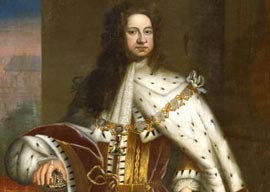
May 14, 2015

George I
All proper congratulations to David Cameron, elected last week as Prime Minister of Britain on the Conservative Party ticket. I can”t say I repose any great hopes that Cameron will actually conserve anything; but then, Britain’s not my country, so the stakes for me are merely tribal (the Anglosphere), civilizational (the West), and sentimental (I grew up in Britain). Not much; but also not nothing.
Cameron’s actually been Prime Minister for five years already. His party didn”t have a clear majority in the House of Commons, though, so Cameron’s government was a coalition with the gentry-left Liberal Democrats.
Cameron’s own inclinations are gentry-left so the need for a coalition was not personally painful to him; but alliance with LibDem globalist multiculti tree-huggers was inhibiting to the small number of genuine conservatives in Cameron’s parliamentary party. Now that the Conservatives can govern in their own right, these dissidents may find their voice and exert some influence. We”ll see.
I”m surprised, and somewhat depressed, to find that of the 56 persons to have served as British Prime Minister, 14 of them”a precise quarter”held office in my own lifetime.
Even more depressing, I never met any of them. The closest I ever got to a Prime Minister was in October 1964 when Harold Wilson arrived at Euston Station in London after his party won the general election of that year. I was a student at University College just across the road, so I went over to join the crowds at Euston welcoming him. The back of my head is visible in news photographs of the scene.
(The American historian Arthur Schlesinger had met Wilson two years previously: “He is immensely clever, immensely self-satisfied and skates on the edge of pomposity.” To us college radicals, though, Wilson was a champion of modernity who would sweep the cobwebs from the halls of Britain’s reactionary establishment, strike down inherited privilege, and establish an efficient socialist utopia of justice and equality. Ah, youth!)
The office of Prime Minister didn”t exist in any formal way until 1721, when Sir Robert Walpole was the first to hold the title. Walpole had been Prime Minister in all but name for long before that, though. This year in fact marks the three hundredth anniversary of him taking up the reins”of Britain having a Prime Minister de facto if not quite de jure.
Let’s take a brief trip down History Lane, back to 1715.
In those days the monarch was still a force in ruling Britain. He could, in theory at least, dissolve the actual government and form a new one more to his taste.
There had, however, been a change of dynasty in 1714. Queen Anne, the last of the Stuarts, had failed to produce an heir despite having endured seventeen pregnancies. (I have always thought that Anne’s husband, George of Denmark, should have been given some kind of award for effort. George, an amiable nonentity, was the person of whom Charles II said: “I have tried him drunk and I have tried him sober and there is nothing in him.”)
The law required a Protestant monarch, so Anne’s nearest Protestant relative, the German George of Hanover, was shipped over to be George I. He opened a straight run of four Georges, collectively memorialized by a Victorian wag in the ditty:
George the First was always reckoned
Vile; but viler George the Second.
No-one ever said or heard
A decent thing of George the Third.
When to Heaven the Fourth ascended
God be praised! The Georges ended.
The wag’s humor was premature: the 20th century brought forth two more Georges, and the Brits likely have yet another in their future.